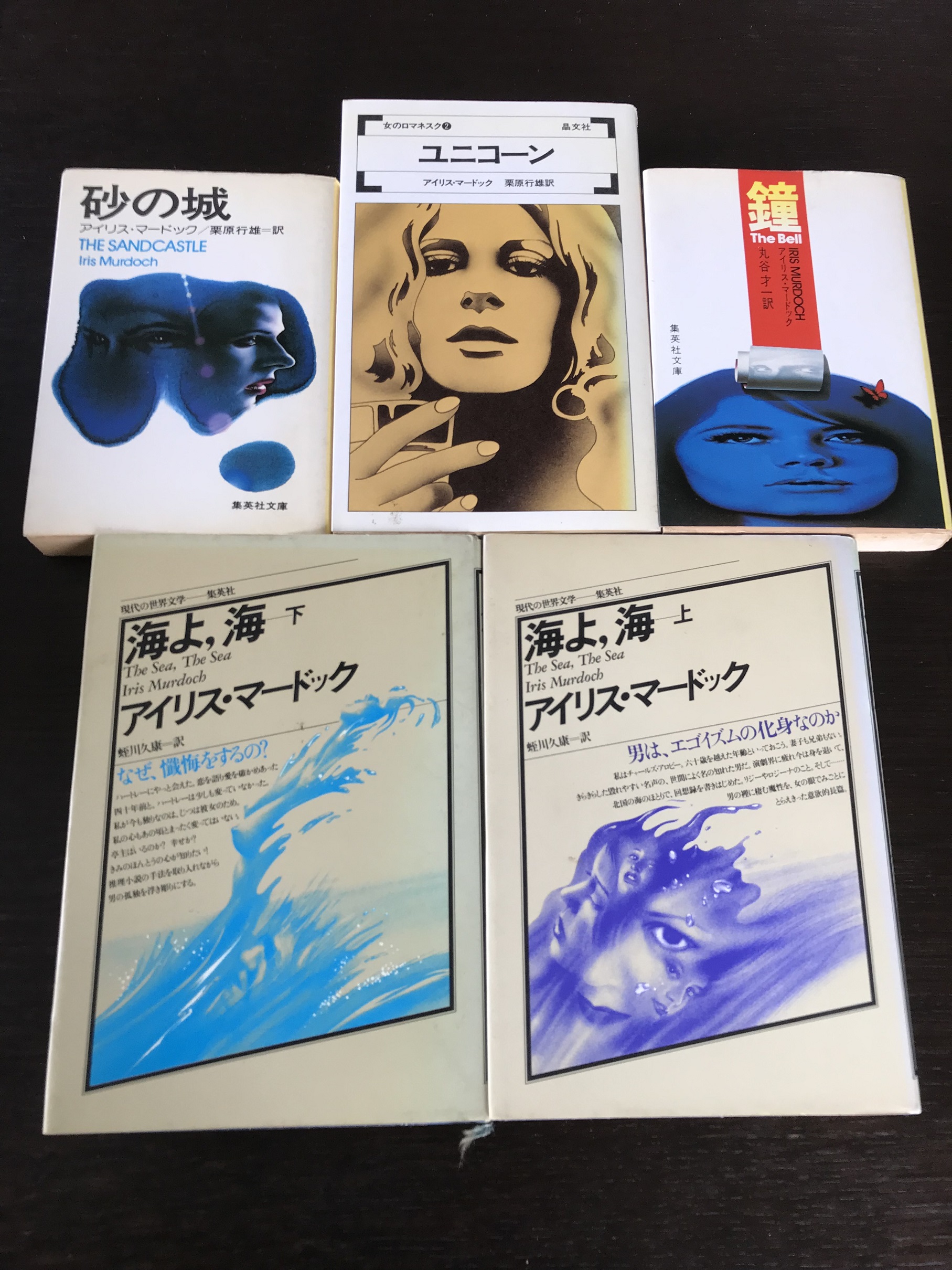Iris and the Missing Tape
I had read a few of Iris Murdoch’s novels before moving to Japan in the 1980s. Now in Japan, with a part-time position teaching English at a university in Kobe, I became acquainted with two full-time staff, Professors Ueda and Imazawa. Ueda was a published poet with an interest in T.S. Eliot; Imazawa an expert on E.M. Forster. A habit grew of my visiting one or other of these colleagues for tea and a chat after my lecture on Friday afternoons. I discovered, on Professor Imazawa’s shelves, a complete (up to then) set of Iris Murdoch’s novels. I borrowed these regularly until I had read all of them.
I became enthralled by Murdoch’s world and, not wanting to keep it to myself, presented my wife Midori with copies in Japanese translation of The Sandcastle and The Bell for her birthday. She subsequently went on to read The Unicorn, The Sacred and Profane Love Machine, A Word Child, and The Sea, the Sea, all in Japanese.
The last of these was in two volumes, a common practice in Japan where lengthy novels are often split in two and published (and sold) as separate books. Midori was a bit irritated at the plethora of unnecessary explanatory footnotes in one or two of the translated books; amused at the sudden declarations of love in the novels; and – largely ignoring any philosophical aspects – convinced by Murdoch as a great entertainer with fascinatingly intricate plots.
Then the great thing happened and Iris Murdoch herself visited Japan along with husband John Bayley at the request of the British Council. They stayed for around two weeks and the lecture Iris gave in Kobe that I attended took place at the Kobe Institute of St Catherine’s on Friday 28 May 1993. This wide-ranging talk was on ‘The Modern Novel’.
All this was three decades ago, of course, and through the mists of time I remember little of the actual content of the lecture. What I do remember is the arrival of Iris and John in the lecture theatre after a suitably effusive introduction by someone who correctly referred to her as one of Britain’s greatest living novelists. The novelist and her husband then appeared as a slightly dishevelled couple, Iris clutching a carrier bag from which emerged her notes.
I recorded the whole lecture on cassette tape and so had it all down for posterity, or so I thought. After her talk there was plenty of time for questions from the audience and I took the opportunity to ask her whether her concerns had changed over the long time that she had been writing novels, especially as the books had lately become much longer. She listened attentively to this, making notes as she did so, and then proceeded to give an answer that to my shame I have almost completely forgotten.
John Bayley joined in with the Q&A session, mentioning his wife’s work at one point and saying that though he felt reluctant 'to sing the praises of one’s spouse'. Iris was nevertheless an author of the most marvellous novels. Her current one, awaiting publication later that year, was The Green Knight.
There was a general mingling of participants after the lecture, and I was able to meet both Iris and John, albeit briefly. The Book and the Brotherhood, published in 1987, was and remains a great favourite of mine. I had brought along my hardback copy and Iris signed it for me – and it was my turn to sing her praises while she listened attentively again. She remarked that its protagonist David Crimond was one of her favourite creations.
The next month Iris wrote to Josephine Hart: 'We have just been to Japan (our third visit) and seen the latest marvels and talked at universities. They are all amazing. Didn’t see Fuji however, he was wreathed in mist.'
Also in June 1993, she wrote to Naomi Lebowitz: 'I have also been with John to Japan (visiting various universities and enjoying the Japanese).' She then adds: 'This year, I begin to feel terribly tired, and I keep forgetting things – and I have had to make speeches which I don’t like.'
This latter comment is poignant now in the light of her subsequent illness. At the time of our meeting, however, the lecture she gave and the discussions she took part in, there were no signs, at least to me, of anything other than a brilliant mind and an illuminating talk.
As for the cassette tape, I made an extra copy and sent it to Professor Ueda, who wrote back that he was pleased and surprised to recognise my voice on the tape asking Iris a question.
By the end of the 1990s I had moved from Kobe to Mie Prefecture to take up a full-time position at Kogakkan University. The tape presumably went with me. Now with my own research allowance I was able to acquire all my Iris Murdoch reading courtesy of the university.
Eventually I took early retirement and we moved again, this time to the subtropical island of Okinawa, closer to Taiwan than to mainland Japan. Now fully retired, I have been able to re-read all of Iris Murdoch’s novels and her philosophy too. But still that tape hasn’t turned up. Professor Ueda is now well into his eighties, and we are in contact just once a year when we exchange a New Year's greeting card. Maybe he still has his own copy of that lecture, but I couldn’t possibly trouble him to look for it after all these years.
In his memoir Widower’s House, John Bayley tells the story of a pie that he and Iris had bought and were looking forward to eating. The pie mysteriously went missing and despite numerous searches, arguments and some recrimination, they never found it. Subsequently the term ‘Gone to Pieland’ became a joke between them for all the lost things that must be somewhere in the house but never found.
I may have to resign myself to the fact that my tape of the lecture ‘The Modern Novel’ has simply gone to Pieland.


